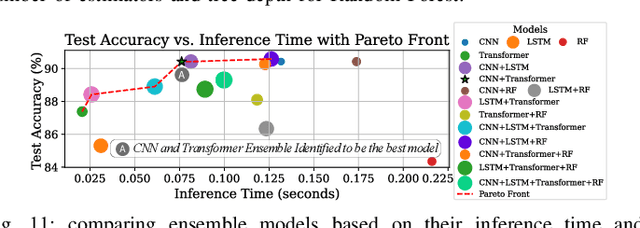Maha Nawaz
CognitiveArm: Enabling Real-Time EEG-Controlled Prosthetic Arm Using Embodied Machine Learning
Aug 11, 2025



Abstract:Efficient control of prosthetic limbs via non-invasive brain-computer interfaces (BCIs) requires advanced EEG processing, including pre-filtering, feature extraction, and action prediction, performed in real time on edge AI hardware. Achieving this on resource-constrained devices presents challenges in balancing model complexity, computational efficiency, and latency. We present CognitiveArm, an EEG-driven, brain-controlled prosthetic system implemented on embedded AI hardware, achieving real-time operation without compromising accuracy. The system integrates BrainFlow, an open-source library for EEG data acquisition and streaming, with optimized deep learning (DL) models for precise brain signal classification. Using evolutionary search, we identify Pareto-optimal DL configurations through hyperparameter tuning, optimizer analysis, and window selection, analyzed individually and in ensemble configurations. We apply model compression techniques such as pruning and quantization to optimize models for embedded deployment, balancing efficiency and accuracy. We collected an EEG dataset and designed an annotation pipeline enabling precise labeling of brain signals corresponding to specific intended actions, forming the basis for training our optimized DL models. CognitiveArm also supports voice commands for seamless mode switching, enabling control of the prosthetic arm's 3 degrees of freedom (DoF). Running entirely on embedded hardware, it ensures low latency and real-time responsiveness. A full-scale prototype, interfaced with the OpenBCI UltraCortex Mark IV EEG headset, achieved up to 90% accuracy in classifying three core actions (left, right, idle). Voice integration enables multiplexed, variable movement for everyday tasks (e.g., handshake, cup picking), enhancing real-world performance and demonstrating CognitiveArm's potential for advanced prosthetic control.
MindArm: Mechanized Intelligent Non-Invasive Neuro-Driven Prosthetic Arm System
Mar 29, 2024Abstract:Currently, people with disability or difficulty to move their arms (referred to as "patients") have very limited technological solutions to efficiently address their physiological limitations. It is mainly due to two reasons: (1) the non-invasive solutions like mind-controlled prosthetic devices are typically very costly and require expensive maintenance; and (2) other solutions require costly invasive brain surgery, which is high risk to perform, expensive, and difficult to maintain. Therefore, current technological solutions are not accessible for all patients with different financial backgrounds. Toward this, we propose a low-cost technological solution called MindArm, a mechanized intelligent non-invasive neuro-driven prosthetic arm system. Our MindArm system employs a deep neural network (DNN) engine to translate brain signals into the intended prosthetic arm motion, thereby helping patients to perform many activities despite their physiological limitations. Here, our MindArm system utilizes widely accessible and low-cost surface electroencephalogram (EEG) electrodes coupled with an Open Brain Computer Interface and UDP networking for acquiring brain signals and transmitting them to the compute module for signal processing. In the compute module, we run a trained DNN model to interpret normalized micro-voltage of the brain signals, and then translate them into a prosthetic arm action via serial communication seamlessly. The experimental results on a fully working prototype demonstrate that, from the three defined actions, our MindArm system achieves positive success rates, i.e., 91\% for idle/stationary, 85\% for shake hand, and 84\% for pick-up cup. This demonstrates that our MindArm provides a novel approach for an alternate low-cost mind-controlled prosthetic devices for all patients.
 Add to Chrome
Add to Chrome Add to Firefox
Add to Firefox Add to Edge
Add to Edge